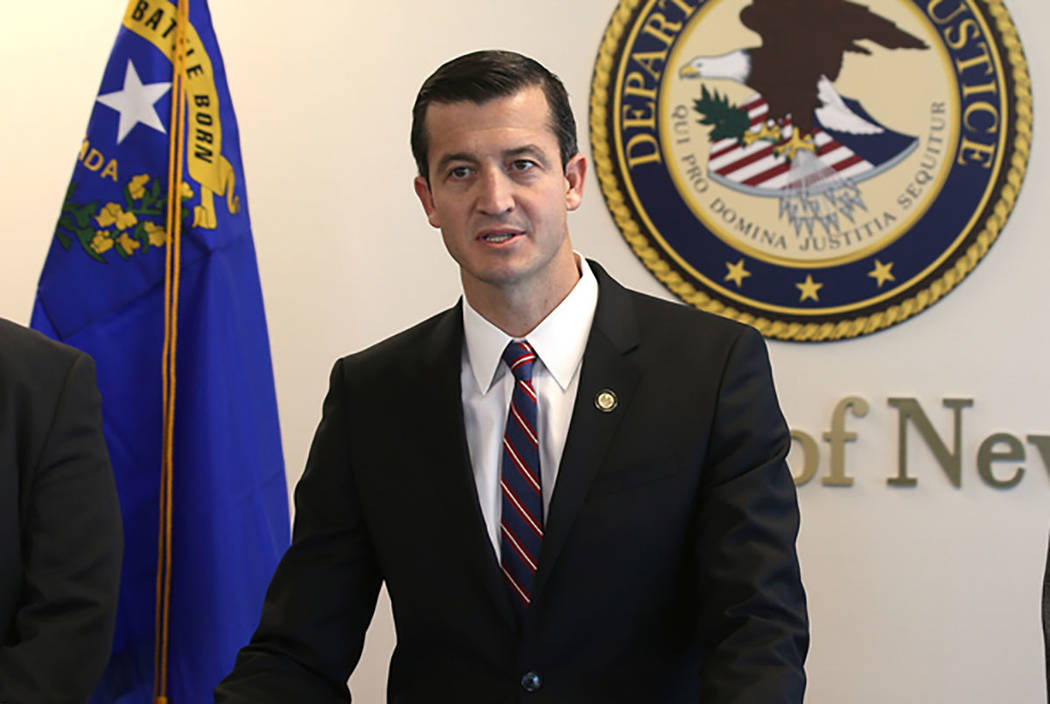New US Attorney Trutanich refuses to rule out marijuana prosecutions — VIDEO
Nevada’s new U.S. Attorney Nicholas Trutanich refused to rule out the possibility of prosecuting marijuana crimes. He said federal agents were victimized during the Cliven Bundy standoff, which is why he’s appealing a judge’s decision throwing out the case. He also believes federal law enforcement can help reduce local crime rates.
“Drug use and crime rates go hand in hand,” Trutanich said while filming Nevada Politics Today. “Nevada’s not safer, because marijuana is available on every single street corner. What I will say about federal enforcement of marijuana laws is that we do so consistent with the priorities of the office and the resources of the office.”
Asked if marijuana crimes were a priority for his office, Trutanich focused on efforts to prosecute other drug crimes.
“What I’m not going to do is sit here and say, ‘We’re going after this. We’re going after that,’” he said. “But we evaluate cases that are brought to us based on the sufficiency of the evidence and the resources that we have in the office. Right now, opioids and fentanyl and heroin are a scourge throughout Nevada. We’ve been a shining star in going after that priority area.”
Asked if that meant marijuana wasn’t a priority for his office, Trutanich said, “No, that’s not what I’m saying. I’m saying I enforce federal law consistent with priorities and resources of the office.”
Trutanich’s office recently appealed a judge’s decision throwing out the case the office brought against Cliven Bundy involving the 2014 standoff at Bundy’s ranch.
“When I think about the Bundy case and the Bundy prosecution, the first thing that comes to my mind are the law enforcement officers that kissed their families goodbye that day in 2014, went to work and were standing at the other end of a high powered firearm or several of them,” Trutanich said. “So, those are victims. They’re real victims of a real crime. What we’ve done at the Ninth Circuit is ask for a review of the remedy that the judge imposed.”
A favorable Ninth Circuit ruling would allow Trutanich’s office to retry the case. He said he’d make the decision in the future.
“The ball is in the Ninth Circuit’s court,” he said. “When the Ninth Circuit pushes it back to my side of the court, we’ll make a decision.”
A priority for Trutanich is Project Safe Neighborhood, which is a collaborative law enforcement effort.
“Project Safe Neighborhood is the best tool in the Department’s toolshed to fight crime in violent neighborhoods,” he said. “The whole premise of it is getting the community leaders together as well as law enforcement — local, state, federal — to go after violent criminals in the most dangerous areas and get them behind bars, off the streets. It’s also a partnership on the other side in prevention and reentry programs, which is equally important. The reason the federal government should be going after violent crime is because we can have a big effect with the type of cases we bring.”
Trutanich cited his own experience as an example of how the program can work.
“I’ve charged cases and been involved in cases where we’ve taken down dozens and dozens of gang members,” Trutanich said. “The murder rate in those areas of the city have fallen from above 30 a year to below 10 a year. So, you can have a real impact when you eradicate an entire criminal enterprise in one prosecution.”
Trutanich opposes legislative efforts to limit cooperation between federal and local law enforcement agencies. “Law enforcement works best when law enforcement is working together,” he said.
When his office works on cases involving illegal immigrants, Trutanich said the focus is on those with criminal backgrounds like gang violence, domestic violence or repeated DUIs.
“Our office brings about 100 immigration enforcement cases every single a year,” he said. “When we bring those cases, we look hard at whether or not that person is meritorious for federal prosecution.”























